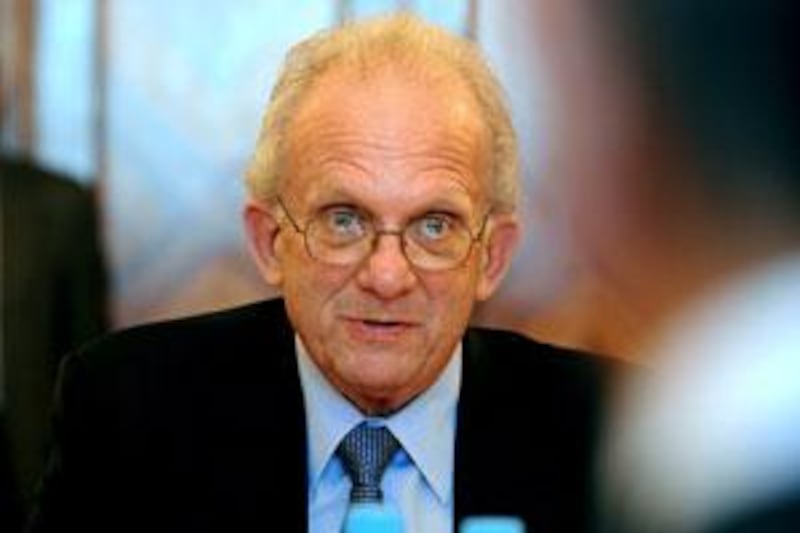WASHINGTON // A joint resolution to approve the civilian nuclear energy accord between the United States and the UAE has been introduced in both chambers of the US Congress, bringing the UAE closer to becoming the first Arab country to harness atomic energy.
Howard Berman, the chairman of the House foreign affairs committee, introduced the resolution in the House late on Monday, calling the so-called 123 agreement a "model" for civilian nuclear co-operation and touting provisions designed to prevent proliferation in the region. A matching resolution was introduced in the Senate by John Kerry, the chairman of the foreign relations committee, and Richard Lugar, the committee's top Republican.
"This proposed agreement contains, for the first time, a binding legal commitment by a foreign country not to enrich uranium or produce plutonium, which can be used either to fuel electricity-generating reactors or nuclear bombs," Mr Berman said. "It demonstrates that there is another way to a truly peaceful nuclear energy programme." The action comes as Congress is reviewing the pact, which was negotiated by the Bush administration and approved by the Obama administration, and as some legislators have expressed concerns about the possibility of nuclear materials and technology ending up in Iran.
The Atomic Energy Act requires Congress to submit a resolution either approving or disapproving of any nuclear sharing agreement, though it does not require that the resolution come to a vote. If Congress takes no action by October 17, the agreement can be entered into force by the president. The UAE Embassy in Washington said in a statement that it was "grateful" for the support of the House and Senate committees.
Mr Berman and Mr Kerry praised the accord's strict non-proliferation conditions, which go beyond those required by the Nuclear Nonproliferation Treaty, and even current US law. The bill includes a "take back" clause that would allow the US to demand the return of all equipment, material and facilities if the UAE violates any provisions. "Senator Kerry thinks that this agreement with its strict ban on the UAE's possession of enrichment and reprocessing technology, and its requirement for the UAE to submit to a tough level of international inspections, can provide a strong model for responsible nuclear co-operation with those law abiding countries in a region where nuclear power makes sense as part of the overall energy mix," said Frederick Jones, the communications director for the Senate foreign relations committee.
But other legislators have raised concerns. Ileana Ros-Lehtinen, the top Republican on the House foreign affairs committee, questioned in a hearing last week whether recent UAE laws designed to strengthen export controls have been adequately implemented. Ms Ros-Lehtinen of Florida, who has led opposition to the deal, said approving it was "one line some of us are not prepared to cross". "Even if all of the promised reforms were already in place, there simply is no track record to determine if they are in fact adequate to the task - particularly in light of the UAE's long history of complicity or negligence regarding trade with Iran and other countries of concern," she said.
Ms Ros-Lehtinen has introduced legislation calling on the White House to certify that the UAE is taking "effective actions" to prevent the transfer of sensitive material to Iran and fully implementing United Nations Security Council sanctions against the Islamic Republic. Mr Berman also cited "outstanding questions", including concerns among some legislators about whether the UAE is doing "everything possible" to prevent Iran from advancing its "illicit nuclear activities".
Mr Jones, the spokesman for Mr Kerry, likewise said that the Massachusetts senator believes "Congress will need to watch closely to ensure that the UAE continues to enhance its ability to control trade in proliferation-sensitive technologies". James McGovern, a Democratic congressman from Massachusetts and chairman of the congressional Human Rights Commission, citing "significant human rights concerns", sent a letter to the House foreign affairs committee last week reminding members of a videotape purporting to show a member of the royal family, Sheikh Issa bin Zayed al Nahyan, abusing a grain trader with whom he had a business dispute. The Abu Dhabi Judicial Department last week said its investigation of the incident continues and that justice would be served "according to the rule of law".
The UAE's civilian nuclear programme is not dependent on the US-UAE deal. It has signed similar agreements with other countries, including South Korea, France and the United Kingdom. Danny Sebright, president of the US-UAE Business Council, which is affiliated with the US Chamber of Commence, praised the joint resolutions approving the US deal. "Both houses have decided to be proactive and enter a resolution of approval, which is a very positive step," said Mr Sebright, who estimates the deal will create tens of billions of dollars in commercial opportunities and more than 10,000 US jobs. "It means if this were ever to come to a vote, they will be looking for votes to approve as opposed to votes to disapprove."
sstanek@thenational.ae






